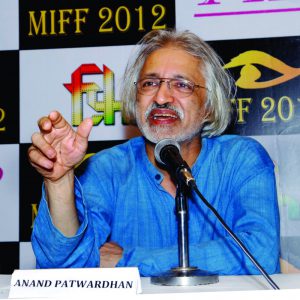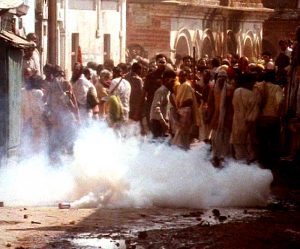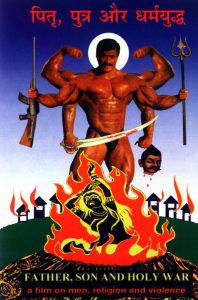Blazing modern India across the screen
‘Brick Lane, you really should be deserted.’ Filmmaker Mark Cousins explains why a weekend of electrifying documentaries by Anand Patwardhan is an unmissable opportunity to catch up with a passionate chronicler of modern India.

I first heard about the films of Anand Patwardhan in the mid 1990s, when Kevin Macdonald and I were co-editing our book on non-fiction cinema, Imagining Reality: The Faber Book of Documentary. I wanted to include much more on Indian cinema in it, but that didn’t work out.
 I ordered Patwardhan’s Father, Son and Holy War (1994) on VHS from, I think, a video store in New York – this was before DVD or email. It cost a lot and I had to wait quite a while, but when it came, I saw something remarkable. It wove together histories of Hindu fundamentalism and masculinity that not only saw connections but degrees of cause and effect. It had the best qualities of journalism, but was essayistic too, and angry, informed, expansive, epic and urgent. Then I managed to see In the Name of God (1992) which was electrifying – an odyssey about anti-secularism. Like news, you could hear the second hand ticking in it, but Patwardhan seemed to keep stepping back to see his fresco, his nation, on screen.
I ordered Patwardhan’s Father, Son and Holy War (1994) on VHS from, I think, a video store in New York – this was before DVD or email. It cost a lot and I had to wait quite a while, but when it came, I saw something remarkable. It wove together histories of Hindu fundamentalism and masculinity that not only saw connections but degrees of cause and effect. It had the best qualities of journalism, but was essayistic too, and angry, informed, expansive, epic and urgent. Then I managed to see In the Name of God (1992) which was electrifying – an odyssey about anti-secularism. Like news, you could hear the second hand ticking in it, but Patwardhan seemed to keep stepping back to see his fresco, his nation, on screen.
I had been teaching film for a while by then, and had become frustrated – scrub that, it was more than frustration, it was rage – that we in the western Anglo or Euro-American world seemed to think “our” documentaries – from the Maysles brothers to Errol Morris– were the best in the world. Such films are wonderful, but the lack of curiosity about Asian documentary astounded me. I was regularly gobsmacked by the fact that, because people hadn’t heard of great Indian or Asian docs, they assumed that there weren’t any. What, so your tendrils reach so far, and our media is so reliable, that you assume that there’s nothing great out there that’s beyond them?
The truth is that the documentary filmmaking which is out there (ie in most of the world) is sometimes so great that it actually changes what it feels like to be “in here”. This is very much the case with Patwardhan’s films. Fuelled by them and other things, I jumped in my 1970s campervan in 2001 and drove from Scotland, where I live, to India. My timing couldn’t have been more Patwardhanian. The right wing BJP was flying the flag in the North of India, and rewriting its history books. There’s no way I would have understood that trip without the lens of Patwardhan.
When I got home, various things happened, including the fact that Doc/Fest, the great film festival in Sheffield in the UK, offered me the chance, over three years, to guest curate. I did so, and chose Asian documentary as my theme. One of the things we did was a retrospective of, and tribute to, Patwardhan. In the year we did it, my own filmmaking had taking off again, so I wasn’t able to be there. But in the catalogue I quoted Patwardhan…
“In the last few decades”, said Patwardhan, “I watched my country sacrifice all the principles that once made me proud of our independence. Non-violence, secularism, egalitarianism were replaced by venality, religious strife and militarism.” Such a complete critique of Indian life was bound to incur the wrath of the authorities and fundamentalists and, indeed, the key Patwardhan films have been banned. But he’s fought the bans in the courts and, in the end, hasn’t had to censor a frame of his work.
Such belief in the power of documentary to change society, to challenge prejudice, to illuminate the fetid shadows of ignorance, is inspiring indeed.
A year or two later I was on the jury of the Hong Kong International Film Festival. One of the competing films was Patwardhan’s latest, Jai Bhim Comrade (2011). I watched, marvelled, tweeted, and raved about this film about dalit people in India (out-caste sections of the population regarded as ‘untouchables’), their principles, politics, persecution and activism. It was a samizdat musical. I went into the jury deliberation determined that it get the top prize. To my great relief, my fellow jurors had loved it too.
 Then, last year, I heard that Patwardhan would be back in Sheffield and, so, I had to go, just to have dinner with him, just to meet the great man. When we met, I was excited. He was calm. He said that he’d like to go to an ordinary English pub to watch a football match or, rather, watch the people watching the match. We found one. It was packed. Standing room only, and cheers at goals. Instead of dinner, we each had a cheese bap, wrapped in cling film. This was when I knew that Patwardhan is not only my kind of filmmaker, he’s my kind of guy. That night we talked a lot, in a night club, about Indian films politics, and people – directors Mani Kaul and Ritwik Ghatak, the naxalites, actor Sharmila Tagore.
Then, last year, I heard that Patwardhan would be back in Sheffield and, so, I had to go, just to have dinner with him, just to meet the great man. When we met, I was excited. He was calm. He said that he’d like to go to an ordinary English pub to watch a football match or, rather, watch the people watching the match. We found one. It was packed. Standing room only, and cheers at goals. Instead of dinner, we each had a cheese bap, wrapped in cling film. This was when I knew that Patwardhan is not only my kind of filmmaker, he’s my kind of guy. That night we talked a lot, in a night club, about Indian films politics, and people – directors Mani Kaul and Ritwik Ghatak, the naxalites, actor Sharmila Tagore.
I’m so jealous that I can’t be at the BFI Southbank for his retrospective but I sincerely hope that the famed streets of London will be a little bit empty when his films are showing. Brick Lane, you really should be deserted. This is a rare chance to have a brainy, brilliant, bracing encounter with the bold realities of modern India, and to meet the remarkably clear-eyed (and generous-hearted) teller of the tale.
Please don’t miss it.